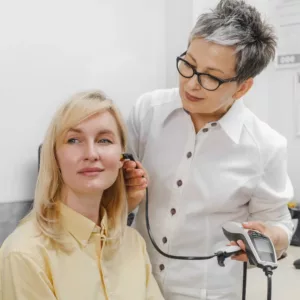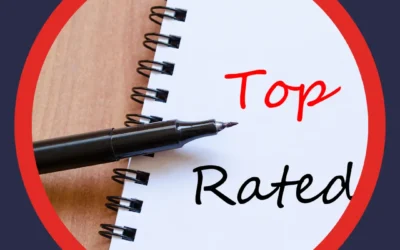Vitamins for Hearing: Can They Help?
Hearing loss affects many people, but did you know that certain vitamins for hearing might help prevent further damage? Although no supplement or diet can magically restore hearing, incorporating specific vitamins into your routine could support ear health.
The Best Vitamins for Hearing Loss
Navigating the health and wellness world, we often search for magic bullets to solve our concerns. Recent studies hint at an intriguing possibility: specific vitamins and nutrients might wield the power to shield our ears from the ravages of time and environment. From the leafy greens on your dinner plate to the bright orange carrots in your snack, a treasure trove of potential ear protectors awaits discovery.

Folate: One of the Best Vitamins for Hearing Health
Emerging research underscores folate’s potential, especially for those over 60. This vitamin, abundant in spinach, lentils, and fortified cereals, has been linked to a reduced risk of hearing loss in older adults. Its role in cell renewal and blood flow could be key to protecting the ears’ delicate mechanisms.
Beta-carotene and B12: Nature’s Ear Protectors
These nutrients, painting our plates with hues of orange and yellow, might guard against hearing loss. Their antioxidant properties can counteract oxidative stress in the cochlea. Women with higher intakes of these nutrients reported a notable decrease in hearing loss incidents, shining a light on the power of a colorful diet. Vitamin B12 may also help treat chronic tinnitus for people with a deficiency in the vitamin, according to a 2016 study published in the journal Noise and Health.
Vitamin C: A Double-Edged Sword
While essential for immune function, higher doses of vitamin C, particularly from supplements, have shown a mixed relationship with hearing health. This calls for a balanced approach, focusing on natural sources like oranges and bell peppers to harness benefits without the risks.
Vitamin E: The Jury is Still Out
Despite its antioxidant prowess, vitamin E’s direct impact on hearing health remains uncertain. The current evidence doesn’t conclusively tie vitamin E intake to a decreased risk of hearing loss, suggesting its benefits might be more general than ear-specific.
The Path Forward with Vitamins for Hearing Health
These studies reveal a nuanced landscape where specific vitamins, notably folate, beta-carotene, and β-cryptoxanthin, show promise in supporting hearing health. However, the science is still unfolding, and what we know today is just the beginning.
Before embarking on any supplement regimen, consulting with a healthcare professional is crucial. They can provide guidance tailored to your unique health profile and needs. Meanwhile, embracing a diet rich in various nutrients is a wise approach to hearing health and overall well-being.
Remember, vitamins are not a standalone solution for hearing loss. They’re part of a broader strategy that includes regular hearing check-ups from your local American Hearing + Audiology center.
Other Minerals and Vitamins for Hearing Health
Delving into the nutritional building blocks of ear health, we uncover how these other essential elements might also contribute to preserving and potentially enhancing our hearing capabilities.
Vitamin A: A Vital Nutrient for Ear Cells
Known for its role in vision and immune function, Vitamin A also supports healthy cell function in the inner ear. While promising, moderation is critical, as excessive amounts can be counterproductive. Always seek medical advice before adding supplements to your routine.
Magnesium: The Nerve Function Ally
Magnesium’s involvement in nerve function suggests a possible benefit to the auditory system. Early research, particularly its role in sudden hearing loss treatment and tinnitus severity reduction, is encouraging yet calls for further exploration.
Omega-3 Fatty Acids: The Hearing Protector
This study highlights the inverse relationship between omega-3 intake and hearing loss, suggesting that these fatty acids could help prevent or delay age-related hearing loss. Fish oil supplements offer an alternative way to include omega-3s for those not keen on fish.
Zinc: Tinnitus Relief for Some
Zinc may offer relief for tinnitus sufferers with zinc deficiencies. This mineral is especially important for those at risk of deficiency, such as vegetarians or individuals with certain health conditions. However, supplementation might not impact tinnitus symptoms for those with normal zinc levels.
Diving into these vitamins and minerals opens up a fascinating chapter in the pursuit of optimal hearing health. While research is ongoing, the potential of these nutrients to support ear health offers a ray of hope. Incorporating a balanced diet rich in these vitamins and minerals could be a proactive step toward maintaining your hearing wellness. Remember, consultation with a healthcare provider before starting any supplement regimen ensures your approach is safe and suited to your health needs.
Discover foods for hearing health.

Beyond Vitamins: Exploring Other Strategies for Maintaining Hearing Health
The journey toward maintaining excellent hearing health encompasses more than just exploring vitamins for hearing health. According to one major ongoing study, it involves a comprehensive approach that blends lifestyle choices, dietary habits, and proactive measures. Let’s delve into strategies that go beyond vitamins, focusing on enriching your hearing health holistically:
Embrace a Healthy Lifestyle
- Adopt a Nutrient-Rich Diet: Fuel your body with a diet abundant in fruits, vegetables, whole grains, and lean proteins. This nutritional foundation supports not just hearing but your entire body’s well-being.
- Stay Active: Regular physical activity boosts blood flow, positively affecting your ears and enhancing your overall health.
- Keep Stress at Bay: High stress levels can adversely affect your hearing. Meditation, yoga, or deep breathing can help manage stress.
- Watch Your Weight: Excess weight may give you a higher risk of hearing problems. A balanced diet and regular exercise can help keep your weight in check.
- Kick the Smoking Habit: Smoking can damage the blood vessels and delicate hair cells in the inner ear. Quitting smoking boosts your overall health and helps preserve your hearing.
Safeguard Your Hearing
- Limit Loud Noise Exposure: Steer clear of prolonged exposure to loud noises. This includes loud music, machinery, and noisy environments.
- Invest in Hearing Protection: Earplugs or noise-canceling headphones are essential around loud sounds. They can help prevent damage to your hearing.
- Be Cautious of Everyday Noises: Tools and appliances can also contribute to noise exposure. Use ear protection when around loud tools or machines.
Tackle Health Issues Head-On
- Manage Health Conditions: Diabetes or high blood pressure can affect your hearing. Proper management of these conditions is vital for hearing preservation.
- Consult Your Doctor: Regular check-ins with your healthcare provider are essential, especially if you have concerns about your hearing or overall health.
A balanced lifestyle, careful noise management, and addressing health conditions form the cornerstone of good hearing health. While the best vitamins for hearing loss offer supplementary benefits, they are part of a broader, more integrated approach to hearing wellness.

The Real Vitamins for Hearing Are Your Hearing Check-Ups
Regular check-ups emerge as the true vitamins for hearing health in safeguarding your hearing. These check-ups are pivotal in preserving your auditory wellness, offering a wealth of benefits:
- Spotting Changes Early: Hearing loss often creeps in unnoticed. Routine check-ups catch these changes early, setting the stage for timely interventions. Acting swiftly can broaden your treatment options, enhancing your communication skills and daily engagement.
- Tracking and Protecting: These visits establish a hearing health baseline, enabling your audiologist to monitor shifts over time. Early detection of issues allows for immediate action, preventing further auditory damage. Tackling risks like noise exposure early on is vital to preserving your hearing.
- Customized Care: Audiologists employ their expertise and cutting-edge tools to tailor care to your unique hearing profile. They might recommend hearing aids, devices for assistance, or strategies for managing tinnitus. Regular appointments ensure your hearing care plan aligns with your needs, offering optimal support.
- Boosting Overall Well-being: Addressing hearing loss early can help you prevent the risks of untreated hearing loss, like social withdrawal, depression, and cognitive decline. Proactive hearing care enriches social interactions, mental health, and quality of life.
- Guidance Tailored to You: The ideal frequency of your hearing check-ups varies based on age, lifestyle, and specific hearing concerns. Your audiologist will provide personalized recommendations to fit your situation.
- A Smooth Process: Hearing evaluations are generally straightforward and comfortable, making them an easy step toward maintaining hearing health.
- A Worthwhile Investment: Prioritizing your hearing now can prevent future hurdles and expenses, enhancing your life’s soundtrack.
Your hearing is invaluable. At American Hearing + Audiology, start your journey to better hearing with our free hearing evaluations. Ensure you capture every precious sound life has to offer.



